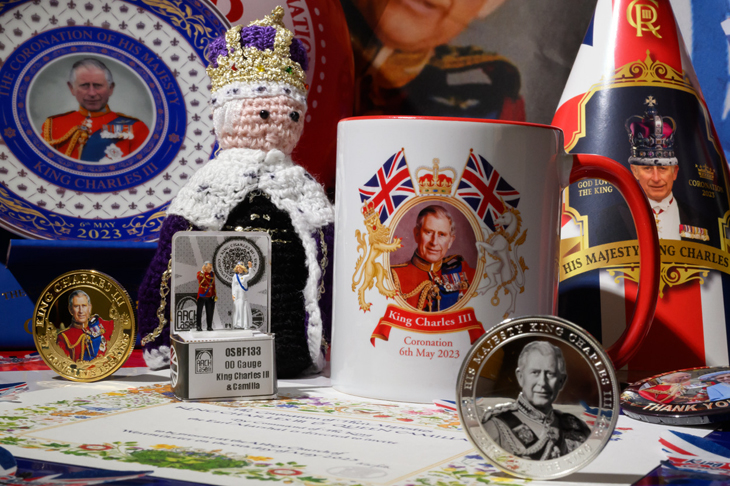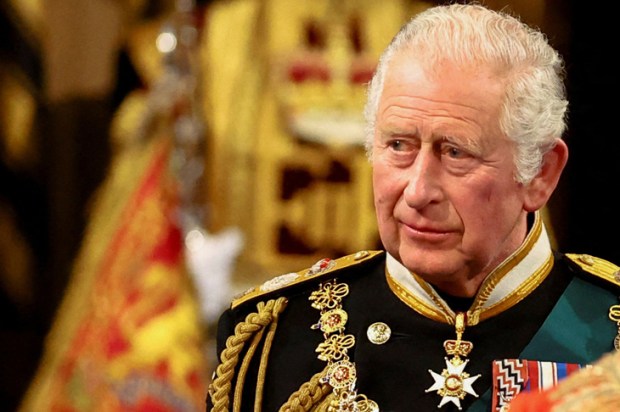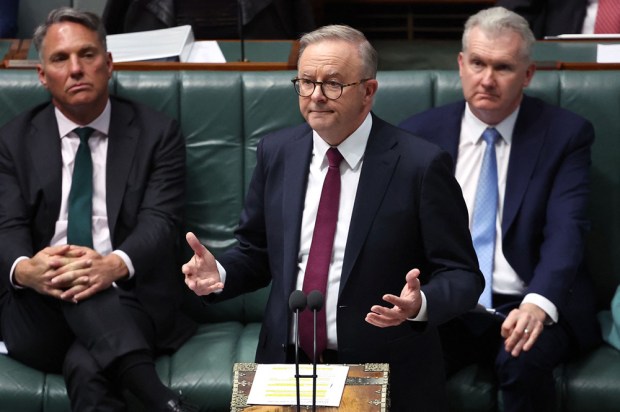‘The Coronation of the King and the Queen Consort signifies the unerring obligation of their Majesties to the Commonwealth, dedicating their lives to serve the nation,’ declared His Majesty’s Australian Deputy Prime Minister, the Hon. Richard Marles.
As if he were reading from an ACM-prepared script, he continued, ‘The bestowal of the Crown and the investiture of regal power exemplifies the pledge of their Majesties to a life of total dedication, duty and sacrifice.’
So is talk of another republic referendum in the second term now passé?
With this volte-face, Australians would not be surprised were the Executive Council to revoke the gratuitous insult to the late queen and the present king in the appointment of a parliamentary secretary as assistant minister for ‘the’ republic.
The fact is this coronation, the ninth since the 1788 settlement, recalls the golden thread that goes from the Magna Carta, through the Glorious Revolution, the settlement itself and the formation of our federal commonwealth under the Crown.
Notwithstanding today’s serious problems, the Australian Commonwealth remains one of the half-dozen oldest continuing democracies in the world.
The coronation is not some curious, quaint and superfluous ceremony. It is directly relevant to the past, present and future, including the still unrealised potential of the Australian Commonwealth.
There was a fortunate conjunction in 1788. Great Britain was by far the most benign, civilised and advanced colonial power that the world had seen or indeed, would see.
Do not think for a moment that imperialism is dead. The most hideously brutal empires were all twentieth-century creations, the Nazi Reich, the USSR transmogrifying into Putin’s Russia and the Maoist monstrosity which, with the treason of Western elites, also transmogrified into the superpower rival of the United States now under a presidential family funded by Beijing’s vast riches.
But in 1788, the two key personnel were civilised men of strength and compassion. First, Home Secretary Thomas Townshend, 1st Viscount Sydney, an outspoken opponent of the misguided war with the American colonies. The other was his choice as NSW governor, Arthur Phillip, a choice rightly described as inspired.
Apart from the men and women on the First Fleet, Phillip did not come alone.
He brought with him those sound institutions which are the reason why Australia, despite the more recent depredations of the politicians, had soon become one of the world’s oldest continuing democracies.
Although founded as a penal colony, Lord Sydney insisted New South Wales not be a military prison.
Accordingly, Phillip came with what are still the foundation pillars of Australia – the rule of law, the English language, leadership beyond politics through the Crown and our Judeo-Christian values. Surprisingly soon, representative democracy, with responsible government as well as a constitutional system would be gifted by the colonial power. Finally came federation, almost all our own work.
As to our Judeo-Christian values, these remain the very basis of our civil society without which the very best constitution cannot function. Note the reference is to ‘values’ and not religion. In fact, Australia has long welcomed those from other religions and indeed, no religion.
But it was precisely those values which led the British not only to lead the outlawing of that abominable and unfortunately world-wide institution, slavery, but also to have the Royal Navy, then the world’s most powerful, police the British-imposed ban on the trans-Atlantic trade.
With an extraordinary and unique heritage, this is why Australians must continue to do what they have always done. Reject proposals for constitutional change which have been made, as the founders warned, in haste or by stealth. Rather they should only accept change where the proponents have provided credible evidence that the change proposed is ‘desirable, irresistible and inevitable’.
Australians must do two things to save this nation. Cling to what we have and work to significantly improve the governance of the nation, a nation which delinquent politicians seem so determined to set on the path of decline. That is why the coronation is important.
It confirms, at significant points, what are the pillars of this nation, pillars which we must preserve and clearly build on.
We see these in the various parts of the ceremony, from the opening Recognition through the Oaths, the centrepieces, the Anointing and Crowning, and the conclusion, the Enthronement and the Homage.
The Oaths recall the centrality of the Crown in our system of representative democracy and responsible government. As the new NSW Liberal Democrat MP John Ruddick recalled in a recent ADH.TV interview, the Crown is important not for the power it wields, but in the power it denies others.
Yet all three constitutional models proposed over the last three decades by the politicians’ mouthpiece, the Australian Republican Movement, were for politicians’ republics. In each one, the power of the politicians would be singularly and unnecessarily enhanced.
The most Judeo-Christian part of the coronation liturgy, in English redolent of the Book of Common Prayer, can be found most strongly in the Anointing.
A consecration or setting apart, the Anointing is considered so sacred that it is conducted under a canopy. It can therefore be neither seen nor filmed.
In it, the Archbishop intones the blessing that ‘…as Solomon was anointed king by Zadok the priest and Nathan the Prophet, so be you anointed, blessed and consecrated King over the Peoples, whom the Lord thy God hath given thee to rule and govern’.
We are thus conscious throughout of the links to the past; we should however also remind ourselves of the links to the future. As the great Burke observed, society is a partnership ‘not only between those who are living, but between those who are living, those who are dead, and those who are to be born’.
The Coronation, with its ancient language, dress and accoutrements thus links us back beyond Federation and the settlement of 1788 to the Magna Carta and also forward to reigns yet to come, under the heirs apparent, William and George, and beyond.
God save the King!
Got something to add? Join the discussion and comment below.
Get 10 issues for just $10
Subscribe to The Spectator Australia today for the next 10 magazine issues, plus full online access, for just $10.
You might disagree with half of it, but you’ll enjoy reading all of it. Try your first month for free, then just $2 a week for the remainder of your first year.














Comments
Don't miss out
Join the conversation with other Spectator Australia readers. Subscribe to leave a comment.
SUBSCRIBEAlready a subscriber? Log in